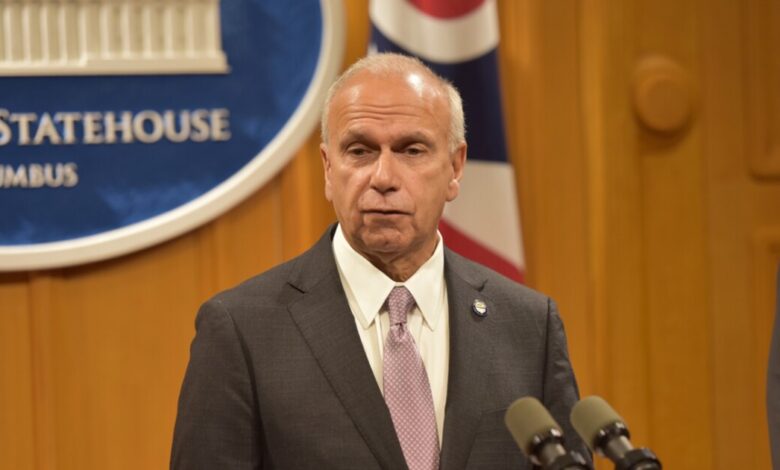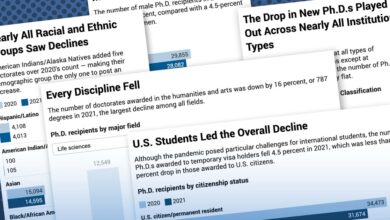Hundreds of Students, Faculty, and Administrators Speak Out Against Ohio’s Proposal to Reform Public Colleges

Florida and Texas have drawn much of the national attention over lawmakers’ efforts to reform higher ed this year. But Ohio’s legislature hosted a dramatic, seven-hour committee hearing on Wednesday — in which hundreds of students, faculty, and administrators sought to articulate the consequences of lawmakers’ sweeping proposed changes to public colleges in the state.
Introduced in the Ohio Senate last month, the 39-page SB 83 would ban mandatory diversity training, prohibit the use of diversity statements in hiring or admissions, and prevent higher-ed employees from striking. It could also have the effect of preventing institutions from funding diversity offices.
SB 83 would also prevent institutions from accepting donations from individuals or institutions based in China, as well as require colleges to institute new post-tenure-review policies; use specific, state-mandated language in their mission statements; and post all course syllabi on their websites.
The hearing, held by the state Senate’s Workforce and Higher Education Committee, drew over 100 professors and over 90 students, most of them undergraduates, and most of them testifying in opposition to the bill.
A dozen college staff members and administrators voiced opposition, including the dean of Ohio State University’s College of Public Health. The Ohio School Psychologists Association argued that the legislation could cause all school-psychologist training programs in the state to lose their accreditation.
Six people testified in support of the bill.
Bobby McAlpine, undergraduate student-body president at Ohio State, said he commissioned a survey of almost 1,600 undergraduates, with 82 percent responding that they “do not believe that Ohio State faculty, staff, or administration seek to impose certain political beliefs on them.” Ohio State has about 47,000 students.
According to McAlpine, 86 percent of student respondents said Ohio State’s DEI efforts were meaningful in some way. One respondent who answered that such efforts were not meaningful wrote: “Why should we have to learn about them anyway? They don’t even deserve to be here. Senate Bill 83 should be passed.”
Such a statement shows that the legislation is having an impact on campus, McAlpine said. “We’re already seeing, in this huge survey size of people, that the language of this bill is clearly making students already speak out against people that look like me, against people that have marginalized identities,” he said.
Potential Impacts
At Wednesday’s hearing, Republican lawmakers spoke of the bill as a way to level the academic playing field for conservative students who, they said, are often scared to speak up in class or face retaliation for their opinions when they do.
State Rep. Josh Williams, a Republican and proponent of the bill, said he had that experience while pursuing a law degree at the University of Toledo. During a class, he said, he expressed the opinion that the United States shouldn’t adopt an open-border policy. Later, Williams said, a law professor commented on one of Williams’s Facebook posts, saying that his views reminded him of the Nazi Party. Williams said he was also harassed by fellow students, both online and in class.
On another occasion while attending law school, Williams said, a student with opposing views deliberately signed up to be his note taker (a disability accommodation enabled Williams to get notes taken for days he missed). But Williams said the student refused to take notes for him on the days he missed class. After he reported the student to the university, the note taker would copy down the law cases discussed in class only as they appeared in the textbook. An investigation was eventually opened into the notetaking, according to Williams.
“I have personally been warned that I would be blocked for advancement in the space of higher education for expressing opinions widely accepted outside of academia,” Williams said.
Students and others who opposed the bill expressed concern with its language surrounding “controversial beliefs or policies,” which some said could be construed to prevent factual scientific concepts, like climate change, from being taught.
SB 83 would require faculty and staff to “allow and encourage students to reach their own conclusions about all controversial matters and shall not seek to inculcate any social, political, or religious point of view.”
The bill defines “controversial beliefs and policies” as “any belief or policy that is the subject of political controversy, including issues such as climate change, electoral politics, foreign policy, diversity, equity, and inclusion programs, immigration policy, marriage, or abortion.”
It is unclear what would happen to diversity, equity, and inclusion programs if SB 83 is passed. The bill states: “No state institution shall fund, facilitate, or provide any support to any position, material benefit, policy, program, and activity that advantages or disadvantages faculty, staff, or students by any group identity, except that the institution may advantage citizens of the United States or this state.” (The Chronicle has included SB 83 in our interactive tracker of DEI legislation across the states.)
A fiscal note on the bill’s financial impact written by the Ohio Legislative Service Commission, a nonpartison group that provides financial and policy analysis to the Ohio General Assembly, said that while passage of the bill could result in administrative cost savings for universities, it could also significantly increase administrative costs.
“Some of these provisions may marginally increase administrative costs for state institutions, while others will increase administrative costs more substantially. When taken as a whole, however, administrative costs may increase significantly, potentially resulting in the need to hire additional staff to handle the increased workload,” reads the analysis.
The analysis also said that SB 83 would raise costs for the Ohio Department of Higher Education, which is funded by the state.
Some students who testified against the bill said they are deliberately choosing to attend graduate school outside the state, and they believe other students will follow suit if SB 83 passes.
“I applied to five of the best schools in the entire nation for my graduate field, and I got into every single one of them with funding to boot. All not in Ohio, because I am intimately familiar that this bill might actually impact my graduate education, and therefore, I am choosing to go elsewhere,” said Lalitha Pamidigantam.
At Wednesday’s hearing, Sen. Jerry C. Cirino, a Republican and the bill’s primary sponsor, said SB 83 does not attack or weaken tenure.
“I’ve had lots of dialogue with our university presidents about this subject, and they have made a strong case that eliminating tenure would be very disadvantageous for the state of Ohio, so this bill does not do that,” Cirino said.
He was also adamant that the bill would not eliminate DEI programs.
“DEI is not outlawed in SB 83. The mandatory nature of it would be,” Cirino said. He later added, “I’ve had a lot of questions from people who obviously haven’t read the bill, because” DEI is “not prohibited in SB 83. I’d just like to clear that up.”
Source link






